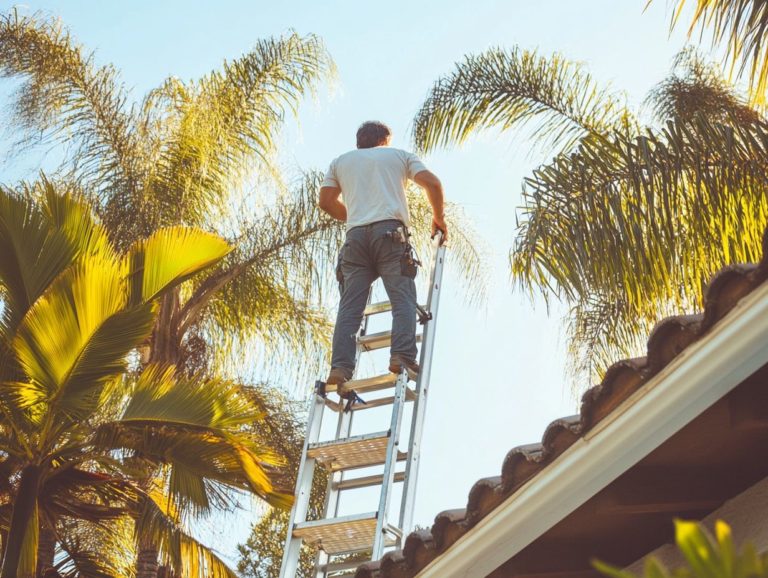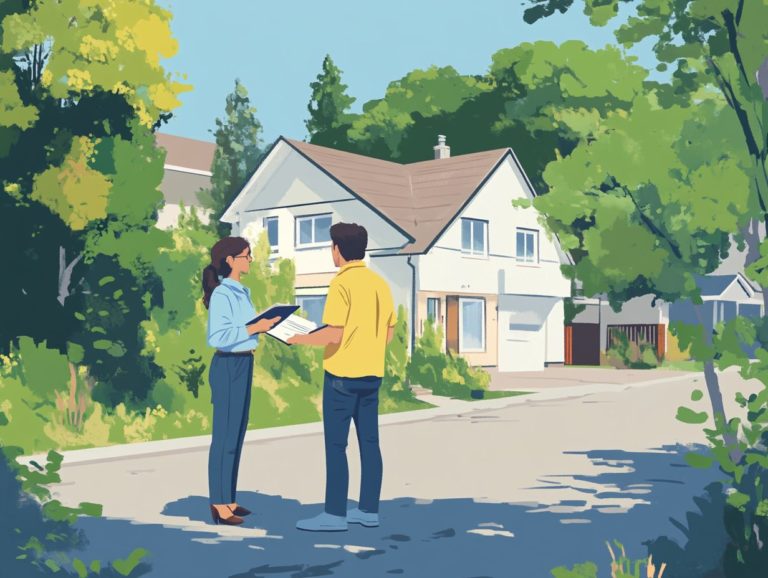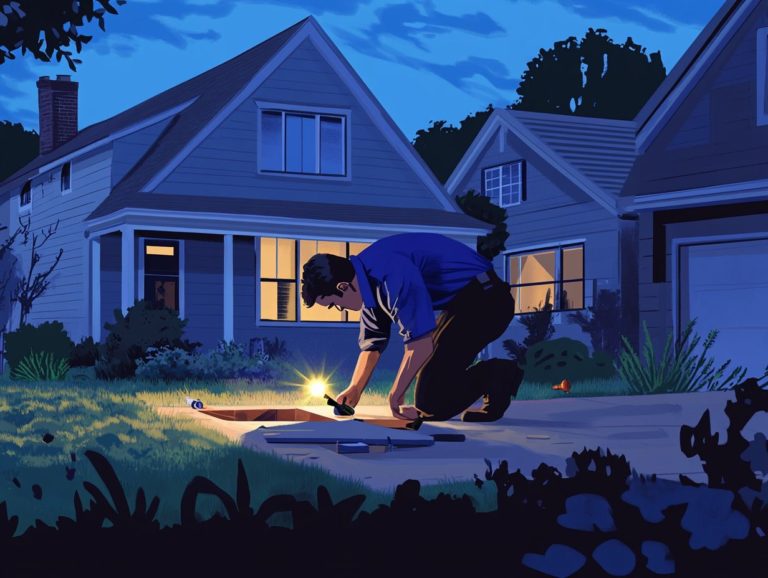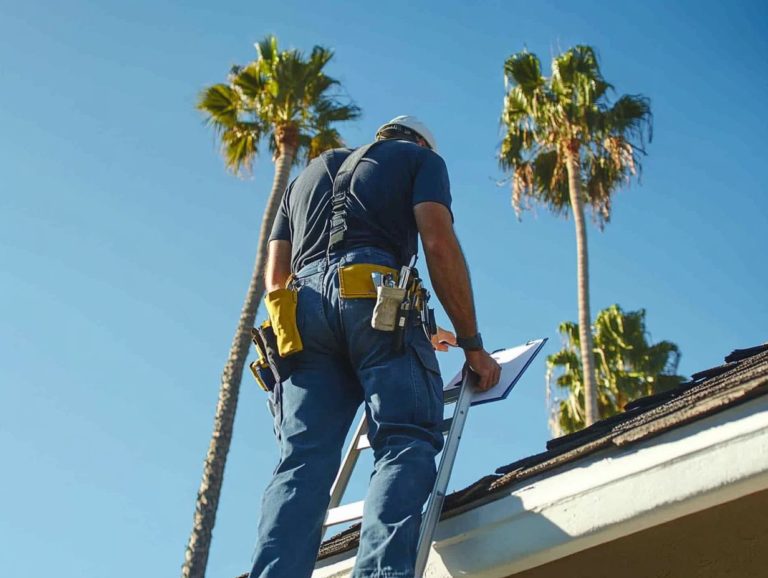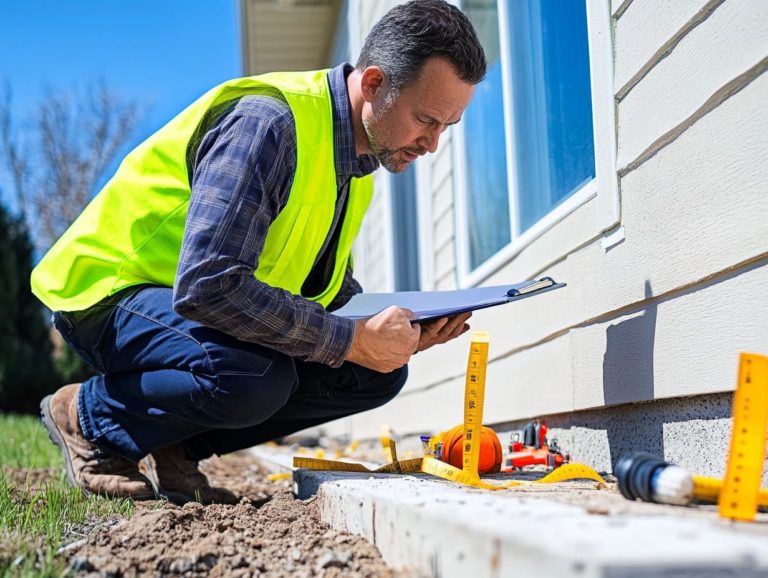How to Choose the Right Inspector for Your Property
When you’re navigating the complexities of buying or selling a property, inspections become an invaluable part of securing a wise investment. A careful property inspection can reveal underlying issues, sparing you from unexpected expenses in the future.
So, how do you find the perfect inspector for your needs? You need to know what makes a great inspector and formulate the right questions to ask.
This guide will walk you through the crucial steps to selecting a qualified property inspector, empowering you with the insights necessary for a successful inspection process!
Contents
- Key Takeaways:
- Why Property Inspections are Important
- Qualities to Look for in a Property Inspector
- Questions to Ask Before Hiring an Inspector
- How to Find and Evaluate Inspectors
- Preparing for the Inspection Process
- Frequently Asked Questions
- What qualifications should I look for in a property inspector?
- What types of properties can a home inspector evaluate?
- How much does a property inspection typically cost?
- What should I expect during a property inspection?
- Do I need to be present during the property inspection?
- What should I do if the property inspection reveals issues?
Key Takeaways:

Choose an experienced and credentialed property inspector who pays attention to detail and has strong communication skills. Act fast! Research and compare inspectors today to secure the best choice for your property. For more guidance, check out how to select a home inspector for your needs to prepare for the inspection process by understanding what to expect and how to get your property ready for the inspection.
Why Property Inspections are Important
Property inspections are essential in your journey as a homebuyer, particularly in Texas. They play a crucial role in uncovering potential issues lurking within a property’s structure.
When you engage a qualified home inspector for a thorough examination, you gain valuable insights into safety hazards, structural concerns, and deficiencies in critical systems like plumbing, electrical, heating, and cooling.
This careful process protects your interests and provides you with a detailed report outlining the property’s condition. Armed with this information, you can navigate negotiations with confidence and ensure you meet all necessary inspection standards.
Understanding the Role of Inspectors
Home inspectors are essential players in the property inspection arena, offering a thorough evaluation of a home’s condition and pinpointing key systems needing attention.
With specialized training and extensive expertise, these professionals ensure that you, as a potential homebuyer or current homeowner, have a clear understanding of your property’s health.
Adhering to strict inspection guidelines and possessing the necessary qualifications, they accurately assess crucial components like plumbing, electrical systems, and structural integrity, which means how well a building is built and holds up over time.
Employing advanced inspection technology, they produce comprehensive reports filled with high-quality images and in-depth analysis. Customer reviews often commend their professionalism and the clarity of their findings, giving you confidence that you’re making informed decisions based on trustworthy assessments.
Qualities to Look for in a Property Inspector
When selecting a property inspector, it’s essential to evaluate a range of qualities that guarantee you hire a licensed professional. For guidance, consider how to choose the right inspector for your property, ensuring you receive a reliable and comprehensive home inspection.
Experience and Credentials
When selecting a home inspector, your focus should be on their experience and credentials, as these elements play a crucial role in shaping the quality of the inspection and the precision of the report.
Consider the diverse array of professional certifications available everything from general home inspection to specialized fields like mold detection and energy efficiency, which refers to how well a property uses energy. These credentials offer valuable insights into an inspector’s expertise.
A seasoned inspector uncovers hidden issues that might otherwise remain concealed, effectively shielding you from unexpected repairs and potential financial strains. This blend of rigorous training and practical experience guarantees a trustworthy assessment of the property’s condition and enhances the overall inspection service, fostering confidence in the process and paving the way for a smoother transaction.
Attention to Detail

A great home inspector needs to have exceptional attention to detail. This allows for a thorough examination and the compilation of an accurate inspection report that truly reflects the property’s condition.
This care is vital for spotting potential repairs and catching issues that might be overlooked in the property’s major systems, such as plumbing, electrical, and roofing.
Experienced inspectors often have a knack for uncovering hidden mold growth in damp basements. They can also detect pest infestations in attics issues that can pose serious health risks and lead to significant repair costs if left unchecked.
By meticulously assessing these crucial components, they ensure that you, as a prospective homeowner, are fully informed about the property’s condition. This enables you to make sound decisions and effectively safeguard your investment.
Communication Skills
Ever wondered how a good inspector communicates complex findings? Effective communication skills are crucial for home inspectors. You need to convey complex findings in a way that’s easy for clients and real estate agents to grasp.
This skill not only helps clarify potential issues but also lays the groundwork for well-considered choices. When you present inspection reports in an accessible format complete with visuals, concise summaries, and straightforward language you significantly enhance your client s understanding of the property s condition.
Such transparency builds trust between you and your clients, reinforcing your credibility as an inspector. Ultimately, strong communication elevates the client experience and encourages open dialogue, allowing you to address questions and concerns promptly and effectively.
Questions to Ask Before Hiring an Inspector
Before you hire a home inspector, it s crucial to pose a set of key questions that can reveal their expertise, the services they offer, and how well they match your specific property inspection needs.
Important Inquiries to Make
Interview potential home inspectors. It’s essential to zero in on their inspection report process, fees, and the technology they use during assessments.
Beyond these basics, you should definitely inquire about the types of customer reviews the inspector has received. This can offer you valuable insight into their reputation and reliability.
Understanding how the inspector leverages advanced inspection technology, like drones or thermal imaging, can also be a game-changer, demonstrating their dedication to comprehensive evaluations.
Don t forget to ask how the inspector interprets and presents their findings, especially when it comes to any potential issues. These inquiries are crucial; they ensure you get a well-rounded property assessment.
Asking these questions empowers you to make smart choices! You ll be better equipped for a smoother and more successful home-buying experience.
How to Find and Evaluate Inspectors
Finding and evaluating home inspectors requires a systematic approach that guarantees you select the most suitable professional. Knowing how to spot a good home inspector can make all the difference for your property inspection needs.
Researching and Comparing Options

Researching and comparing various home inspection companies is crucial for making an informed choice that fits your budget and inspection needs.
By carefully evaluating your options, you can gain a clearer understanding of the services offered and ensure you select a provider that aligns with your specific requirements.
Seeking client references can provide valuable insights from past customers about their experiences. It’s wise to consider the inspection fees associated with these services, as they can vary significantly.
Being aware of the availability of local repair services is also essential, particularly if issues arise during the inspection.
Ultimately, assessing companies based on their reputation and customer feedback will lead you to a more satisfying decision, instilling confidence in your home buying journey.
Preparing for the Inspection Process
Preparing for the inspection process is essential for a successful home evaluation. This preparation not only equips you with a clear understanding of what to expect but also helps home inspectors conduct a more thorough examination.
Don’t underestimate this step; being prepared can make all the difference! It ensures all parties are well-informed and confident throughout the experience.
What to Expect and How to Prepare
During a home inspection, you can anticipate a comprehensive assessment of the property s condition. This evaluation reveals hidden issues that might elude you during a casual viewing.
The inspection process typically includes a meticulous examination of vital components such as the roof, foundation, plumbing, and electrical systems. Inspectors utilize special tools like infrared cameras and moisture meters to detect potential problems that might slip past the naked eye, enhancing the precision of their evaluations.
The inspector evaluates safety features and checks for compliance with local building codes. Grasping the findings in the inspection report is essential, as it offers valuable insights into the current state of the home and potential future expenses that homeowners may encounter.
Frequently Asked Questions
What qualifications should I look for in a property inspector?
Look for a certified and experienced property inspector to ensure a thorough evaluation! Check if they are members of reputable organizations such as the International Association of Certified Home Inspectors (InterNACHI) or the American Society of Home Inspectors (ASHI). Additionally, ask for references and read reviews from previous clients to ensure you are choosing a qualified and trusted inspector. For further guidance on this process, you can refer to how to choose the right real estate agent for you.
What types of properties can a home inspector evaluate?

A qualified home inspector can evaluate all types of properties, including single-family homes, apartments, condominiums, and commercial buildings. They possess the knowledge and expertise to inspect a variety of structures and provide a thorough report on the condition of the property.
How much does a property inspection typically cost?
The cost of a property inspection can vary depending on factors such as the size and location of the property, as well as the services included. On average, a home inspection can cost between $300 and $500, but it is recommended to get quotes from a few different inspectors to compare prices and services.
What should I expect during a property inspection?
During a property inspection, the inspector will thoroughly evaluate the structure, systems, and components of the property. This includes examining the roof, foundation, plumbing, electrical, and heating, ventilation, and air conditioning (HVAC) systems, as well as checking for any potential safety hazards. The inspector will then provide a detailed report outlining any issues or areas of concern.
Do I need to be present during the property inspection?
While it is not required, it is recommended to be present during the property inspection. This allows you to ask questions and gain a better understanding of the property’s condition. It also gives the inspector the opportunity to explain any findings in person and provide recommendations for maintenance or repairs.
What should I do if the property inspection reveals issues?
If the property inspection uncovers any major issues or concerns, talk to the inspector right away about these findings and consider seeking advice from a professional contractor. You can also ask the seller to address these issues or negotiate the price of the property based on the inspection results. Ultimately, the property inspection report is a valuable tool for making an informed decision when purchasing a property.

